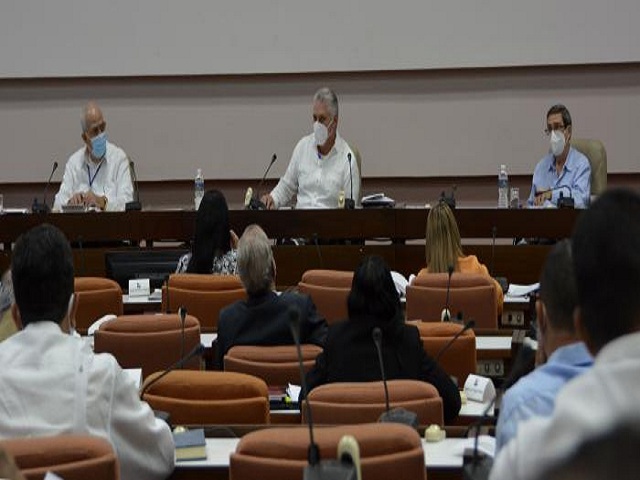Havana: The Cadre Policy is managed, directed, has components, has processes that are closely related, and when they are violated, the processes in its conduct are broken.
“We do not need the good ones to come to be cadres, we need the best, the best companions, those with the most revolutionary qualities, the most ideological qualities and the most professional qualities, charisma, work and experience to know the main processes “.
The President of the Republic, Miguel Díaz-Canel Bermúdez, addressed it with that precision, when intervening in the in-depth analysis that took place this Friday as part of the working session of Commission No. 3 of the 8th Congress of the Communist Party of Cuba, in which the Politics of Cadres was analyzed, an issue that is the backbone of partisan work.
All the issues that we are going to be discussing here, which are the issues of the country, said the Head of State, are those that are also on the public agenda of the people; and “for the purposes and projections of this Congress to be fulfilled, the cadres have the greatest challenge.”
The open, deep and critical debate generated by the delegates, which was led by the member of the Central Committee Secretariat, Abelardo Álvarez Gil, head of its Organization and Staff Policy Department, focused during this day on core aspects associated with the attention and control of the performance of the cadres, their discipline and ethics, as well as the role of the Party’s School System and the confrontation with corruption, crimes, illegalities and indiscipline.
The Cadre Policy, Díaz-Canel emphasized, is a management system, the Cadre Policy is managed, directed, has components, has processes that are closely related, and when they are violated, the processes in its management are broken.
In this sense, he exemplified what happens when it is assigned a cadre that is not known to give it a responsibility. What is that? It is improvisation. And when we assigned a cadre that has not the knowledge in a responsibility, it is because the Cadre policy has not being worked coherently, because it is assumed that one in his organization has worked, has selected, has visualized the people with conditions and has prepared them to promote it.
As part of what is raised in all the procedures of the Staff Policy, he stated, if someone is going to be promoted, designated or elected, the first thing is to investigate the background, where they come from, what their conduct has been, what is what it has contributed, where it has traveled.
When these things fail, President Díaz-Canel valued, it is that the Cadre Policy has not been worked strategically and these are aspects that we have to refine, that we will take them to a different level of achievement to the same extent that there is more awareness of the importance of how strategic this issue is for the Revolution.
Hence the emphasis placed by the president on the importance of analyzing why these things happen s, and “in the places where we have these errors, do all the analyzes, keep working, keep identifying the way we work this as a truly strategic process and as a work system in the Cadre Policy ».
“If we plan all the movements well, there can be no rupture, there can be no improvisation in the Cadre Policy”, he valued.
“To the extent that we learn to work with that as a system, we will undoubtedly be solving those problems.”
At another point in the debate, the Head of State underlined the need for our cadres “not only to know how to lead, but also to have the ability to face with courage, passion, determination and firmness long stages that are complex, like this one that we carry”.
Associated with this, he recalled that at present, when the positive and negative effects that the implementation of the Ordering Task has had in its first moment are evaluated, sometimes it is forgotten how complex the situation in the country was before this decision, a reality That does not even have to do with COVID-19, since more than a year and a half ago a group of important measures began to be applied by the Trump administration.
“Here the problem is not to give up, here we can never give up,” said the member of the Political Bureau. We have to maintain that capacity for confidence that we can overcome prolonged situations of adversity, and, furthermore, that we will always win when we face those conditions of adversity, he assured.
What has to be challenging for us is that, he stressed, that we have that capacity, that we can get out of these situations, that we can overcome them, contributing victories for the Homeland, that is one of the elements to take into account in the preparation of paintings.
On the other hand, he reflected on the way in which one should act when a painting makes a mistake. You have to tell them in time and, in addition, give them the opportunity to rectify; Any of us can be wrong, but if you show the ability to solve, it is also a sign that you can be trusted, he noted.
Directly related to the work of the Party, he stressed the importance of including the secretary of the nucleus when visiting work centers. “If we want them to have a leading role, we must take them into account when visiting the places,” he pointed out.
In the same way, he called for the addition of the secretaries of the zonal nuclei and grassroots organizations with greater intention, a way of acting that he considered as a work system that has to be impregnated in our daily actions.
The Head of State referred to Cuban youth and the need to have them for all tasks. He spoke of giving them the confidence they have earned, and mentioned the uplifting stories they have starred in the red zones in the face of COVID-19. They convened themselves, he said, and that gives us all great teaching.
Finally, he considered that we must also put science into the Policy of Pictures, with experts that lead us to innovate on these issues.
CADRES THAT ARE CONSTANTLY WITH THE PEOPLE
The debates this Friday in the commission were based on the document Assessment about the Politics of the Party, the UJC, the mass organizations, the State and the Government. Role of the Party to achieve superior results, considered by the delegates as a refreshing, profound text, with a critical spirit and a novel approach, which is the result of a broad analysis carried out throughout the country.
For the first secretary of the Party in the municipality of Cienfuegos, Maridé Fernández López, it is essential to ensure quality in the selection of colleagues who are part of the reserves. Likewise, she considered vital the renewal of colleagues when necessary and the systematic and deep evaluation of performance in a frequent exercise that contributes to the improvement of her partisan work.
We have to promote, said the delegate, people with high moral commitment and ethical conduct. We need cadres that do not improvise and that maintain a direct link with their people.
Meanwhile, the first secretary of the Municipal Committee of Las Tunas, Karen González Velázquez, set her sights on the general secretaries of the nuclei, where, in her opinion, lie the greatest cracks in the cadre policy. Much has been written about these issues, she said, but it has yet to be assumed as a working system.
In the deep and instructive debate of Commission No. 3 of Congress, the first secretary of the Young Communists League, Diosvany Acosta, also intervened, who referred to the follow-up that must be given to young people, to know each one and that they can travel for various responsibilities for your better preparation.
The delegate for Holguín and governor of that province, Julio César Estupiñán Rodríguez, also spoke about the young people. He raised the need for attention when they finish college and arrive at workplaces. That there be valued, he commented, the entire trajectory that they have taken so that they can continue assuming responsibilities.
For Adela Ruíz, delegate from the province of Cienfuegos, these times of pandemic, US blockade and shortages have allowed many young cadres to grow in the face of difficulties and have once again put the strength of Cuban youth and their disposition on the table to take on all kinds of tasks. We have excellent young people, she said, leading the strongest battles alongside our people.
For her part, the delegate Marcia Cobas Ruiz, an official of the Council of Ministers, highlighted the method of rendering accounts of the cadres, widely used in the main commands of the country, but not at the intermediate or base levels. She highlighted the Round Tables and other appearances by ministers and other senior leaders in the press media, which have brought them much closer to the people.
But there are bosses, she argued, who do not respond to the population or who give bad responses, who do not contact their workers, nor are they accountable to their subordinates.
We need cadres, she specified, that are constantly with the people and aware of the most humble people, those who have the most problems.
In that sense, Álvarez Gil considered that being a political cadre is not a job. You need to be a patriot, in the first order, and be willing to take on any situation. You have to have love for the people. He who only accomplishes tasks, he added, will not be a good painting. The main thing is to be a patriot and that is not measured in any performance sheet.
Susely Morfa González, a member of the Provincial Bureau of the Party in Matanzas, highlighted that the report that serves as the basis for the analysis of this working commission carries intrinsic the thought of Fidel and Raúl, as well as the dialectical and renovating gaze of the new generations on how to continue to change the way these issues are addressed and implemented.
In considering it, the passage of young people to the Party must be worked with more intention, since there are many reservations and they are not always used properly. In the same way, she commented on the importance of the renewal actions of those who occupy decision-making positions, since in her province, a large part of them are over 55 years of age.
«It is not renewing to renew; It is not a problem of age”, it is an issue that has to be accompanied by actions that guarantee the adequate transit of people through different responsibilities, she said.
From Pinar del Río, the first secretary of her head municipality, Yudalys Rodríguez Castro, considered that for everything to go well, the issue of the Policy of Paintings is central, that it be worked carefully, that wherever there is a painting it is an example.
The cadre policy, she clarified, is a matter, in the first place, of the Party secretary, who has the responsibility of ensuring that the entire cadre team assumes the task with such priority, because it belongs to everyone.
Niurka Bell Calzado, first secretary of the Party in the municipality of Santiago de Cuba, evaluated as fundamental the attention and control of the performance of the cadres, with whom a constant relationship must be maintained. Permanent care, she valued, not only implies being aware of their professional issues, it is also knowing their personal problems, accompanying them in the most difficult moments, knowing about their family and that they feel supported.
She also shared her experience with the delegates to the 8th Congress, Federico Hernández Hernández, first secretary of the Party in the province of Granma. For him, the work with the paintings is not done a day and already, this is a permanent task, which must be made sustainable over time. Teaching cadres, he declared, implies making calls for attention when necessary, in addition to recognition when things are done well, because that is also a way to train the future leaders of the country.
Roberto López Hernández, delegate for the province of Villa Clara, recognized from the experience of his years in the ranks of the party organization that “one of the main problems that we have had in the course of time has been that of implementation”, of hence his insistence on putting into practice the ideas included in the in-depth document that served as a guide to the work of the Commission. “How we control and execute it lies in its success.”
Up to Commission No. 3 of Congress, likewise, came the experience of the Revolutionary Armed Forces in the Politics of Cadres. In the voice of Major General Raúl Acosta Gregorich, head of the Western Army, it was learned of the rigor with which this issue is carried out: the evaluation and monitoring system, the preparation of the officers to occupy positions, the time strictly established for this and the accountability of the bosses on this preparation of the subordinates.
In the more than twenty speeches, which showed the experiences in many provinces and country agencies, they also dealt with acts of corruption in which cadres at different levels have been involved; the flagrant violation that is committed when a cadre is involved in such an event and is later placed in another management position; superficial evaluations of cadres, which sometimes do not reflect the true results of the work; the movements of paintings from one place to another, without the necessary checks of their previous work; the need to be combative in the face of wrongdoing; and the constant ideological formation of the cadres.
Together with President Díaz-Canel, this working Commission, made up of 94 delegates, led the Chancellor Bruno Rodríguez Parrilla; Army Corps General Álvaro López Miera, Minister of the Revolutionary Armed Forces; and Miriam Nicado García, rector of the University of Havana, all members of the Political Bureau.

Redacción Digital
Equipo de redactores del sitio web de Radio Mayabeque



